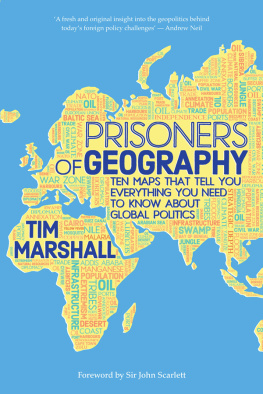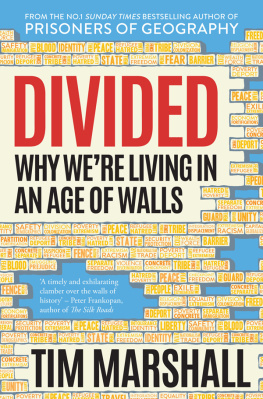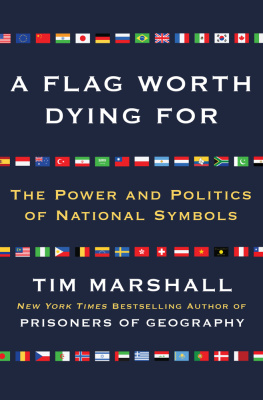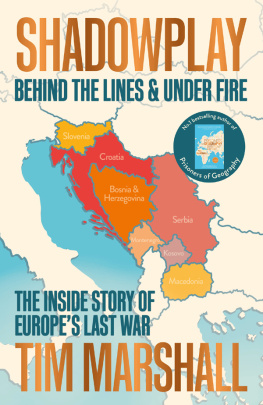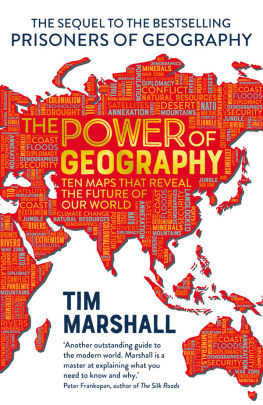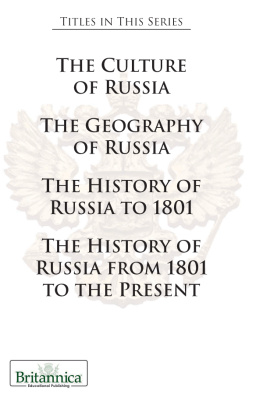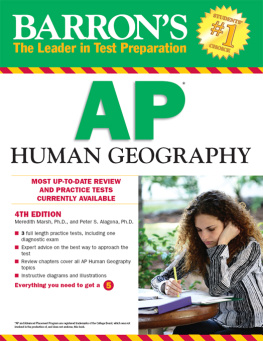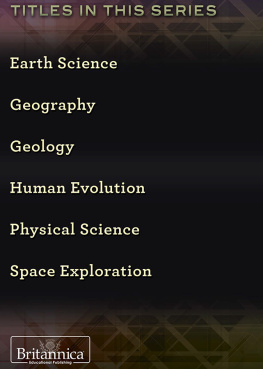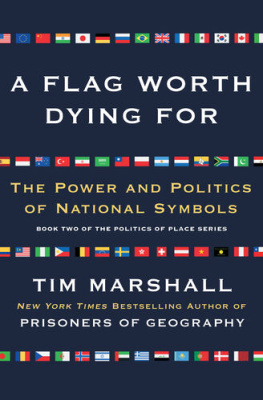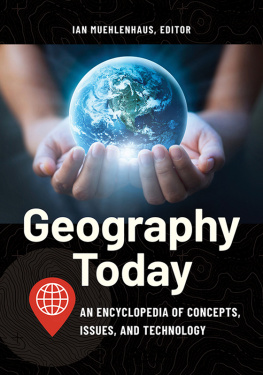Marshall is not afraid to ask tough questions and provide sharp answers His approach is simple but effective. Ten chapters, each accompanied by a map, cover the worlds regions and global powers. Each shows how geography shapes not just history but destiny. In an ever more complex, chaotic and interlinked world, Prisoners of Geography is a concise and useful primer on geopolitics.
Adam LeBor, Newsweek
Sharp insights into the way geography shapes the choices of world leaders.
Gideon Rachman, The World blog, ft.com
An exceptional work, well-researched, argued and documented a treasure of information to satisfy the specialist researcher into contemporary geopolitics and offers a riveting insight to the general reader or student. It is all covered in this magnificent book, which I highly recommend.
Nehad Ismail, writer and broadcaster
There are few foreign correspondents in the current British media who can present an overview of a political situation quite like Tim Marshall in Prisoners of Geography he presents this knowledge and experience quite brilliantly. Its a cleverly written book and underlines what makes Tim Marshall such an effective voice on world affairs.
retroculturati.com
Marshalls latest book explains how politics is nothing without geography, in his crisp and compelling style What he really excels at is capturing the psychology of nations and giving maps a power that politicians must tame.
Top Ten Holiday Reads, Dan Lewis, Stanfords, WorldTravelGuide.net
Quite simply, one of the best books about geopolitics you could imagine: reading it is like having a light shone on your understanding Marshall is clear-headed, lucid and possessed of an almost uncanny ability to make the broad picture accessible and coherent the book is, in a way which astonished me, given the complexities of the subject, unputdownable I cant think of another book that explains the world situation so well.
Nicholas Lezard, Evening Standard
Crisply written and brilliantly argued.
Dame Ann Leslie
An essential and detailed reflection of the geopolitical dynamics that exist globally.
Dr Sajjan M. Gohel
PRISONERS
OF GEOGRAPHY

CONTENTS
FOREWORD
I T HAS BECOME A TRUISM TO THINK, AND TO SAY, THAT WE LIVE IN exceptionally unstable times. The world, we are told, has never been more unpredictable. Such statements invite a cautious, even sceptical, response. It is right to be cautious. The world has always been unstable and the future, by definition, unpredictable. Our current worries could certainly be much worse. If nothing else, the centenary of 1914 should have reminded us of that.
All that said, fundamental changes are certainly under way, and these have real meaning for our own future and that of our children, wherever we live. Economic, social and demographic change, all linked to rapid technological change, have global implications which may mark out the times we live in now from those that went before. This may be why we talk so much about exceptional uncertainty and why geopolitical commentary has become a growth industry.
Tim Marshall is unusually well qualified, personally and professionally, to contribute to this debate. He has participated directly in many of the most dramatic developments of the past twenty-five years. As his Introduction reminds us, he has been on the front line in the Balkans, Afghanistan and Syria. He has seen how decisions and events, international conflicts and civil wars, can only be understood by taking full account of the hopes, fears and preconceptions formed by history and how these in turn are driven by the physical surroundings the geography in which individuals, societies and countries have developed.
As a result, this book is full of well-judged insights of immediate relevance to our security and well-being. What has influenced Russian action in Ukraine? Did we (the West) fail to anticipate this? If so, why? How far will Moscow push now? Does China at last feel secure within what it sees as natural land borders, and how will this affect Beijings approach to maritime power and the USA? What does this mean for other countries in the region, including India and Japan? For over 200 years the USA has benefited from highly favourable geographical circumstances and natural resource endowment. Now it has unconventional oil and gas. Will this affect its global policy? The USA has extraordinary power and resilience, so why is there so much talk of US decline? Are the deeply embedded divisions and emotions across North Africa, the Middle East and South Asia intractable, or can we detect some hope for the future? Finally, and maybe most importantly for our country, the United Kingdom, which is one of the largest and most global economies: how is Europe reacting to the uncertainties and conflicts nearby, and not so nearby? As Tim points out, over the past seventy years (and especially since 1991) Europe has become accustomed to peace and prosperity. Are we at risk now of taking this for granted? Do we still understand what is going on around us?
If you want to think about these questions, read this book.
Sir John Scarlett KCMG OBE,
Chief Secret Intelligence Service (MI6), 20042009
INTRODUCTION
V LADIMIR PUTIN SAYS HE IS A RELIGIOUS MAN, A GREAT supporter of the Russian Orthodox Church. If so, he may well go to bed each night, say his prayers and ask God: Why didnt you put some mountains in Ukraine?
If God had built mountains in Ukraine, then the great expanse of flatland that is the North European Plain would not be such encouraging territory from which to attack Russia repeatedly. As it is, Putin has no choice: he must at least attempt to control the flatlands to the west. So it is with all nations, big or small. The landscape imprisons their leaders, giving them fewer choices and less room to manoeuvre than you might think. This was true of the Athenian Empire, the Persians, the Babylonians and before; it was true of every leader seeking high ground from which to protect their tribe.
The land on which we live has always shaped us. It has shaped the wars, the power, politics and social development of the peoples that now inhabit nearly every part of the earth. Technology may seem to overcome the distances between us in both mental and physical space, but it is easy to forget that the land where we live, work and raise our children is hugely important, and that the choices of those who lead the seven billion inhabitants of this planet will to some degree always be shaped by the rivers, mountains, deserts, lakes and seas that constrain us all as they always have.
Overall there is no one geographical factor that is more important than any other. Mountains are no more important than deserts, nor rivers than jungles. In different parts of the planet, different geographical features are among the dominant factors in determining what people can and cannot do.
Broadly speaking, geopolitics looks at the ways in which international affairs can be understood through geographical factors; not just the physical landscape the natural barriers of mountains or connections of river networks, for example but also climate, demographics, cultural regions and access to natural resources. Factors such as these can have an important impact on many different aspects of our civilisation, from political and military strategy to human social development, including language, trade and religion.
The physical realities that underpin national and international politics are too often disregarded both in writing about history and in contemporary reporting of world affairs. Geography is clearly a fundamental part of the why as well as the what. It might not be
Next page
